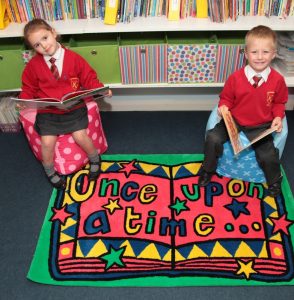Reading is a life skill and is the foundation for future learning, not just in literacy but in other areas such as History and Science.
In reading, by the end of KS2 (Y6), we want the children to:
- be able to enjoy books
- be able to know and explain thye difference between fiction and non-fiction
- be able to enjoy the written word in all its formats – newspapers, magazines, journals, leaflets, poetry etc
- be confident in reading increasingly complicated texts
- be able to work out unfamiliar words using different strategies
- develop a love of reading for enjoyment and for educational purposes
- be able to consider why the author wrote in a particular way and the effect it has upon the reader
- be able to sympathise with characters in a text and be able to provide reasons for their actions / behaviour.
 Reading – Here are some important things to know that will help with your reading:
Reading – Here are some important things to know that will help with your reading:
Early Reader Skills
Knows where to start reading
- Can point to individual words
- Knows how to follow the text onto the next line
- Uses picture cues to predict story and unknown words
- Recognises intial sounds of words
- Knows names of letters in lower case and capitals
- Can recognise key words
Developing Reader Skills
- Recognises words from a key word list and knows the characters and phrases common to the reading scheme
- Is able to predict using story and text
- Is able to chunk up words eg st – or – m
- Uses knowledge of blends eg, ch, sh, fl etc.
- Is able to answer questions about how they worked out unknown words
- Is able to identify words that rhyme
- Can talk about the story and characters, is beginning to use
- expression
Established Reader Skills
- Uses a wide range of strategies to solve unknown words
- Self corrects and re-reads to check their guess makes sense
- Can answer questions about what they have read, giving reasons for their answers
- Can use the ‘word in word’ strategy eg, can – dle – stick
- Uses rhymes to predict words
- Can infer meaning eg, It said …. in the text
- Has a large, secure sight vocabulary
- Reads a range of texts with confidence
Confident Reader Skills
- Is able to use gap strategy to work out the meaning of unknown words
- Is able to make predictions using clues in the text already read combined with past knowledge
- Enjoys reading for pleasure
- Uses contents, index and glossary correctly
- Is developing skimming and scanning skills
- Is able to share their opinion about a book, giving reasons for liking or disliking the storyline or characters
- Is able to read aloud using expression
- Reads, taking into account punctuation
- Is able to read silently and understand what they have read
Experienced Reader Skills
- Is able to read different texts aloud, using pace and voice manipulation to create suspense, excitement and humour
- Understands how punctuation affects reading and interpretation of
- meaning
- Has good library skills
- Is able to make dections by interpreting the language in poetry
- Can scan through text quickly to locate precise information
- Is able to make notes from text, ensuring that all relevant information is included
- Is able to read silently for prolonged periods and then discuss in detail what they have read
Has a knowledge of different authors and is able to comment on their work
KEY WORDS
How many key words can you read and spell?
- the
- that
- not
- look
- put
- and
- with
- then
- don’t
- could
- all
- were
- come
- house
- to
- we
- go
- will
- old
- said
- can
- little
- into
- too
- in
- are
- as
- back
- by
- he
- up
- no
- from
- day
- had
- mum
- children
- made
- of
- my
- one
- him
- time
- it
- her
- them
- Mr
- I’m
- was
- what
- do
- get
- if
- you
- there
- me
- just
- help
- they
- out
- done
- now
- Mrs
- this
- dad
- came
- called
- she
- have
- big
